The Modern Landscape of Prescription Access
The healthcare system has evolved significantly to accommodate patients’ need for convenient prescription access. Modern prescription refill methods prioritize both patient safety and convenience, offering multiple pathways to obtain medications without compromising medical oversight. These alternatives range from pharmacy-initiated programs to telehealth services, each designed to maintain therapeutic continuity while reducing barriers to medication access.medicalnewstoday+3
Regulatory frameworks support these alternatives through carefully structured guidelines that protect patients while enabling access. The Drug Enforcement Administration (DEA) has extended telehealth prescribing flexibilities through 2025, recognizing the importance of remote healthcare delivery in maintaining medication adherence. These regulations ensure that alternative refill methods maintain the same safety standards as traditional doctor visits while providing greater convenience and accessibility.haponline+2
how to get prescription refill without doctor; Key Principles of Safe Prescription Management
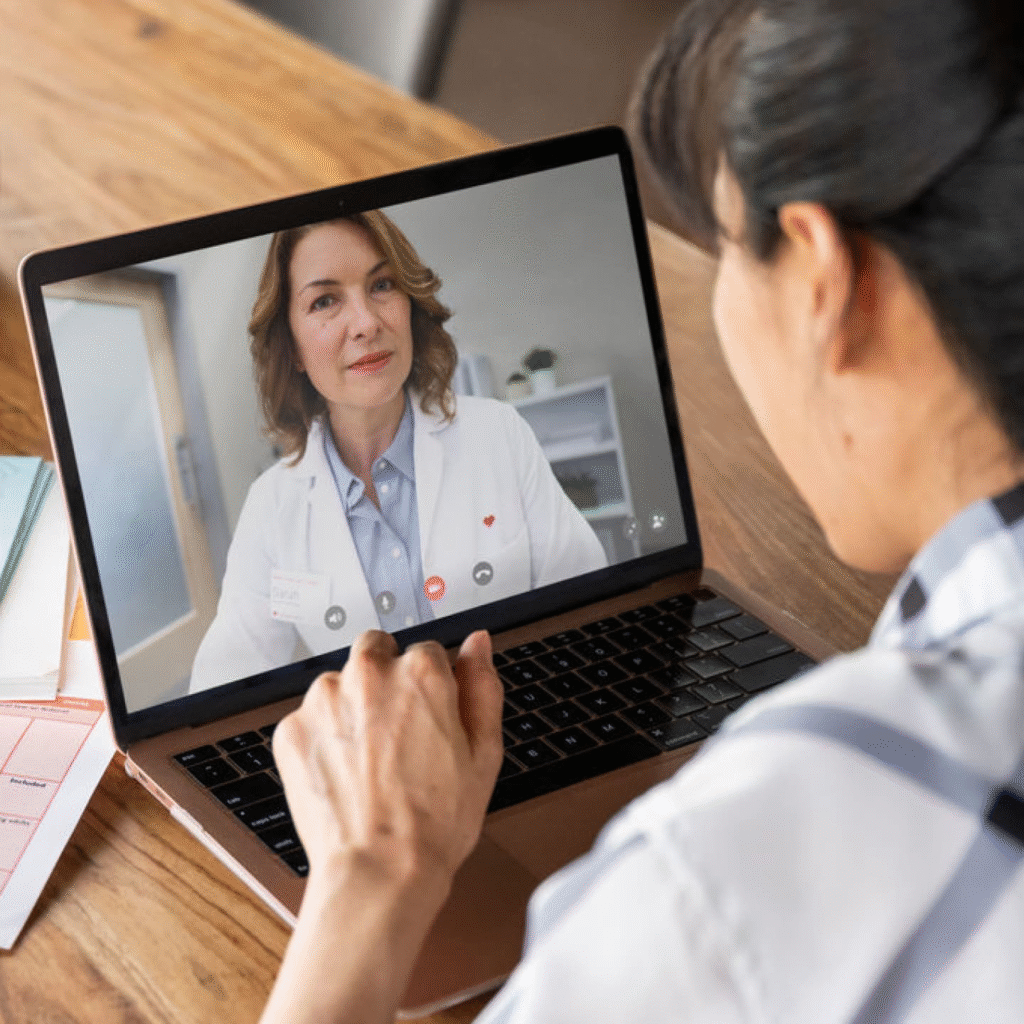
A patient consulting a healthcare professional via a telehealth video call for medical advice or prescription inquiries cvs
Patient safety remains paramount in all prescription refill alternatives. Healthcare providers and pharmacies must verify patient identity, medication history, and clinical appropriateness before dispensing any prescription medications. This verification process ensures that alternative refill methods maintain the same rigorous safety standards as traditional in-person consultations, protecting patients from potential drug interactions, contraindications, or inappropriate medication use.healthline+1
Continuity of care represents another fundamental principle underlying prescription refill alternatives. These methods are designed to bridge gaps in healthcare access rather than replace ongoing medical supervision. Most alternative refill options work best for patients with established medication regimens and stable medical conditions, ensuring that complex or changing health needs receive appropriate medical attention.medicalnewstoday+1
Eight Proven Methods to Get Prescription Refills Without Doctor Visits
1. Pharmacy Automatic Refill Programs: The Most Convenient Option
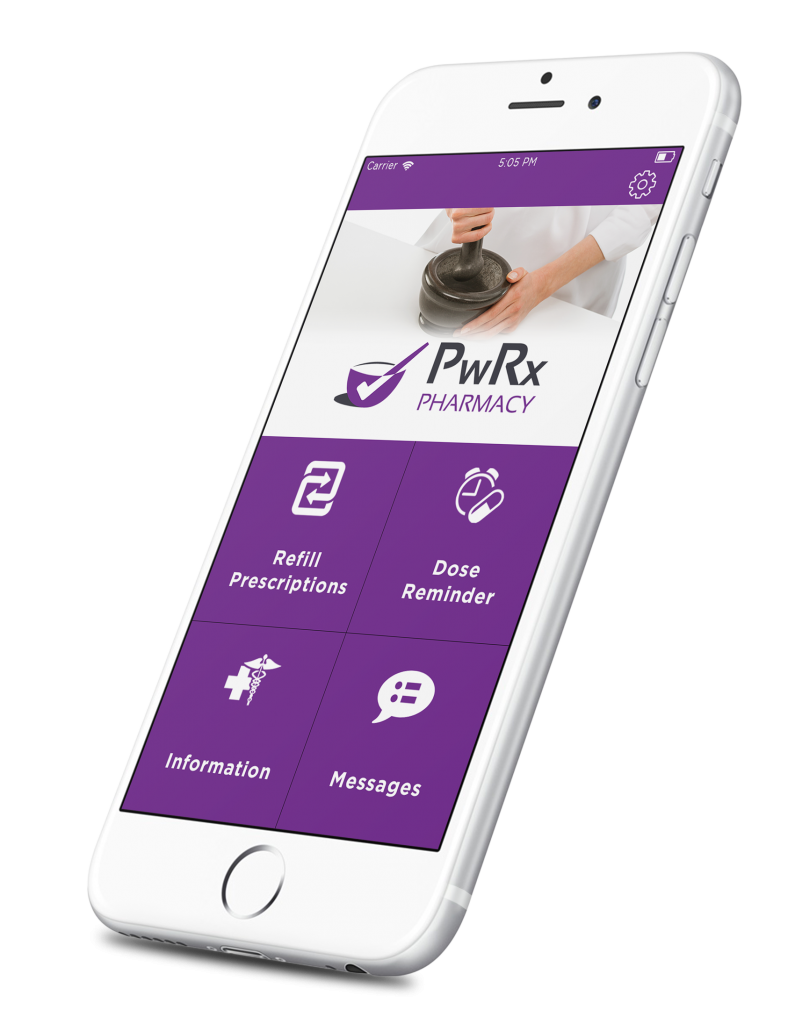
Mobile pharmacy app interface displaying options for prescription refill, dose reminders, and more refillassistant
Pharmacy automatic refill programs represent the gold standard for prescription convenience, automatically processing refills 3-7 days before you run out of medication. These programs work best for maintenance medications used to treat chronic conditions like diabetes, high blood pressure, heart disease, and thyroid disorders. Once enrolled, patients receive notifications when prescriptions are ready, eliminating the need to remember refill schedules or contact healthcare providers.wlpharmacy+3
Enrollment in automatic refill programs requires initial setup with your pharmacy, where staff will identify eligible medications and obtain your consent for automated processing. Most programs exclude controlled substances and short-term medications, focusing on long-term prescriptions that benefit from consistent refill scheduling. The programs significantly reduce medication gaps and improve adherence rates, with studies showing better health outcomes for participants compared to manual refill processes.pmc.ncbi.nlm.nih+1
2. Telehealth Video Consultations: Virtual Doctor Access
Telehealth services have revolutionized prescription access, allowing licensed providers to evaluate patients virtually and issue refills for appropriate medications. These services are particularly effective for routine medication management, minor health concerns, and follow-up consultations that don’t require physical examination. The DEA’s extension of telehealth prescribing flexibilities through 2025 has made these services more accessible and reliable for ongoing prescription needs.medicalnewstoday+4
Virtual consultations typically cost $50-150 and can often be scheduled within hours or days rather than weeks. Many insurance plans now cover telehealth services, making them a cost-effective alternative to traditional office visits. Providers can access electronic health records, review medication histories, and make informed decisions about prescription refills while maintaining appropriate medical oversight.doctorondemand+1
3. Urgent Care Centers: Extended Hours Access
Urgent care centers provide prescription refill services during extended hours, including evenings and weekends when primary care offices are closed. These facilities are staffed by licensed healthcare providers who can review medication needs, perform basic health assessments, and issue prescription refills for appropriate medications. Urgent care visits typically cost $100-250, making them more expensive than telehealth options but still accessible for urgent medication needs.healthline+1
The urgent care approach works best for patients who need immediate medication access and prefer in-person consultations. Providers can perform basic vital signs, review symptoms, and ensure that prescription refills remain medically appropriate. However, urgent care centers may have limited access to complete medical records, so patients should bring medication lists and relevant health information.parkshoredrug
4. Emergency Pharmacy Supplies: True Emergency Access
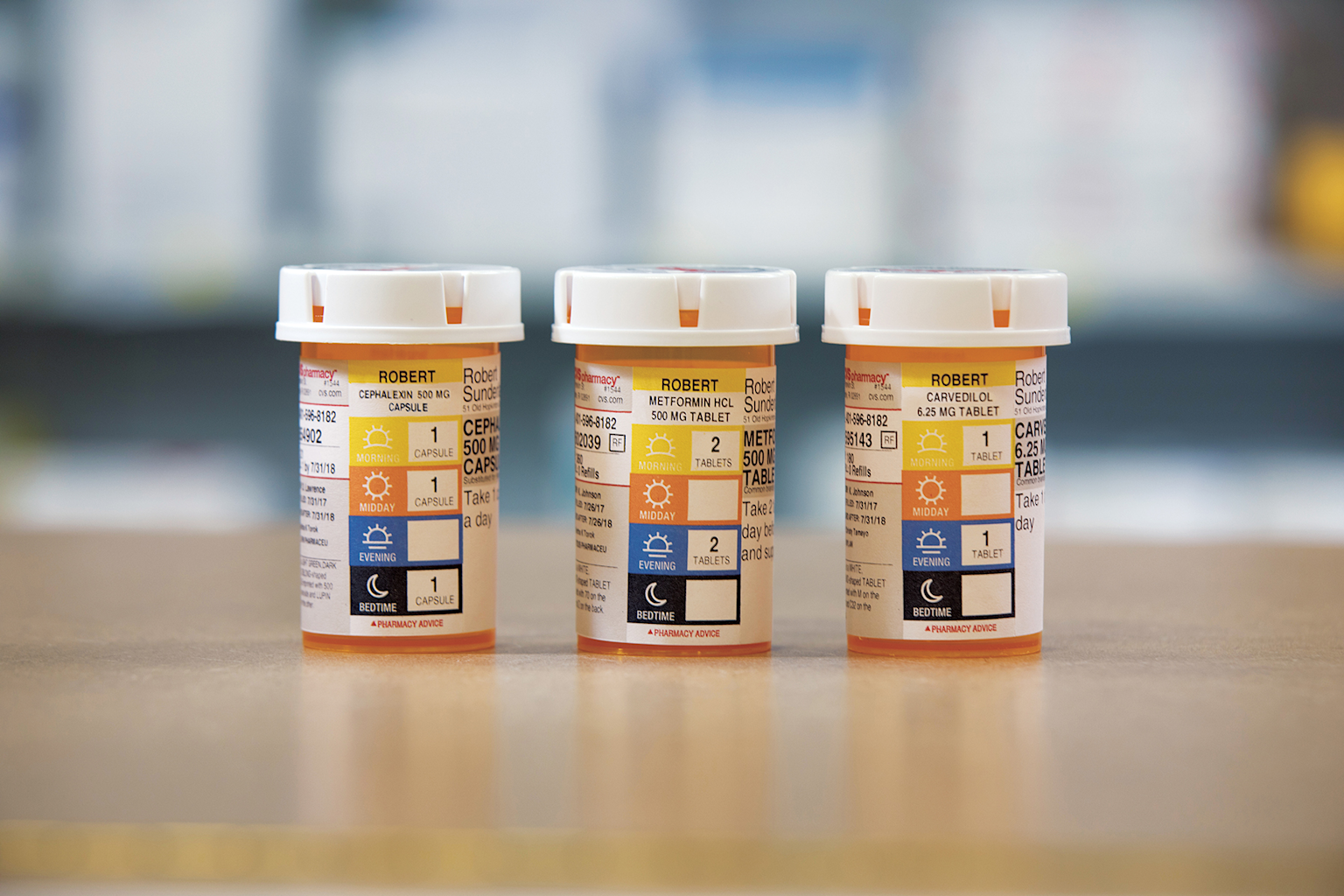
Prescription medication bottles clearly labeled with patient name, medication details, and dosage schedule icons for morning, midday, evening, and bedtime design.sva
Emergency pharmacy supplies provide short-term medication access when patients cannot reach their regular healthcare providers and face immediate medication needs. Pharmacists can provide emergency supplies of essential medications (typically 3-7 days) for conditions where interruption could cause serious health consequences. This option requires pharmacist discretion and is generally limited to medications the patient has previously used.greatermanchester.communitypharmacy+3
Emergency supply regulations vary by state but generally allow pharmacists to provide temporary medication supplies for diabetes, heart conditions, blood pressure, thyroid disorders, and other essential medications. Controlled substances are typically excluded from emergency supply provisions, and patients must have previously used the medication to qualify. Emergency supplies often require full payment since insurance may not cover these dispensings.health+2
5. Prescription Transfer Services: Pharmacy Network Access
Prescription transfer services allow patients to move active prescriptions between pharmacies within networks or to more convenient locations. This option is particularly valuable when traveling or when your regular pharmacy is closed. Many pharmacy chains have nationwide networks that facilitate easy prescription transfers, often completed within hours through electronic systems.healthline+1
Transfer services work best for prescriptions with remaining refills that don’t require new authorization from healthcare providers. Patients can initiate transfers by contacting the receiving pharmacy with prescription details, and the new pharmacy coordinates with the original pharmacy to complete the transfer. This method maintains continuity of care while providing geographic flexibility and extended access hours.
6. Online Doctor Services: Digital Healthcare Platforms
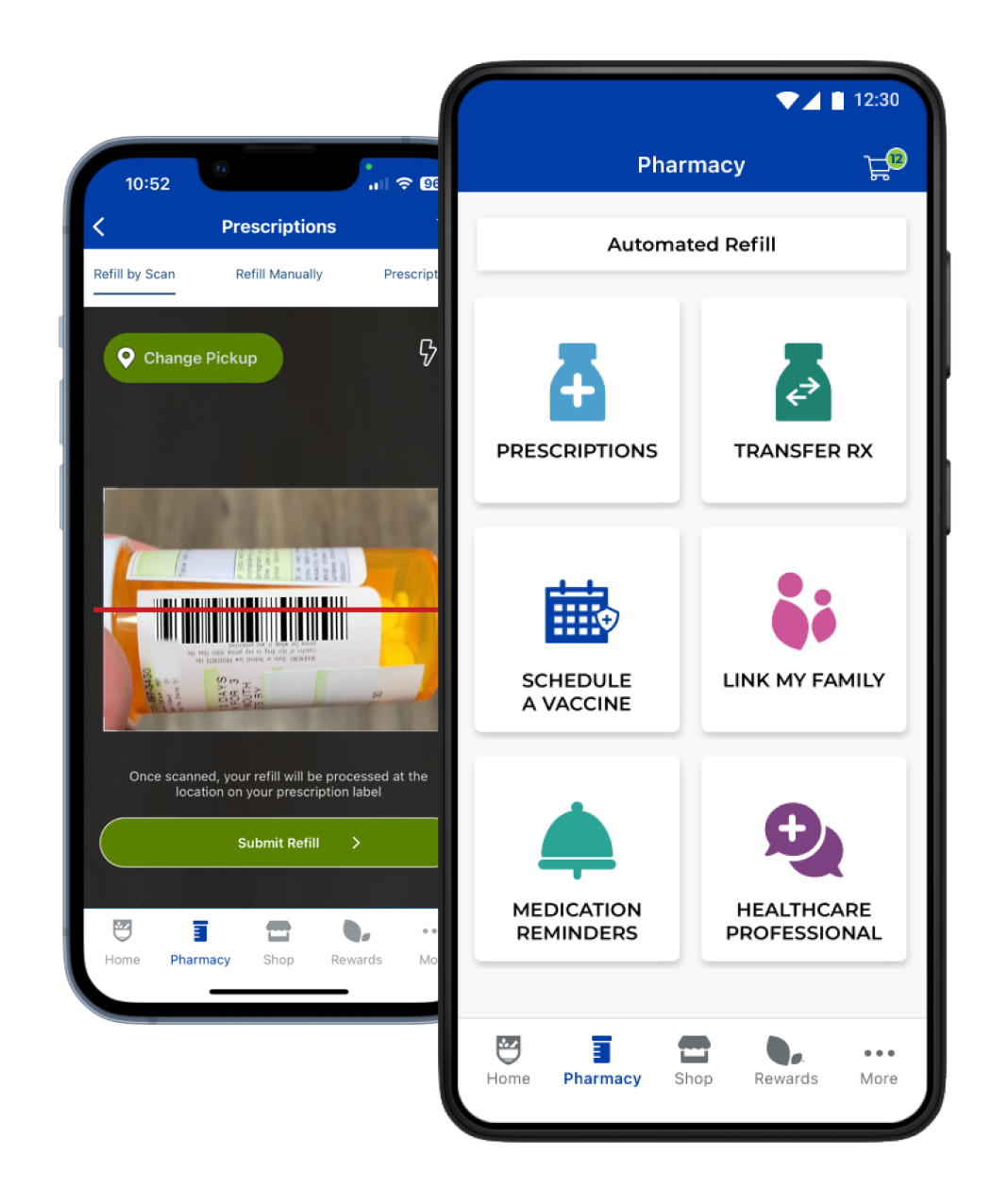
Mobile pharmacy app showing prescription refill by scanning and various pharmacy services for easy medication management riteaid
Online doctor services provide comprehensive digital healthcare through platforms that connect patients with licensed providers for prescription consultations. These services often specialize in common conditions and routine prescription management, offering convenient access to healthcare without geographic limitations. Many platforms maintain provider networks across multiple states, ensuring patients can access care while traveling or relocating.doctorondemand+1
Cost-effectiveness makes online doctor services attractive, with consultations typically ranging from $25-99 depending on the service and consultation type. Many platforms offer subscription models for ongoing care, making them particularly valuable for patients with chronic conditions requiring regular medication management. These services maintain comprehensive digital health records and can coordinate care with existing healthcare providers when appropriate.goodrx+1
7. Pharmacy Consultation Services: Direct Pharmacist Care
Pharmacist consultation services have expanded to include limited prescribing authority and medication management support. Many states now allow pharmacists to provide certain prescription services, manage chronic disease medications, and offer clinical consultations that can support prescription refill needs. These services are typically available during regular pharmacy hours and may be covered by insurance.
Clinical pharmacy services bridge the gap between traditional dispensing and comprehensive medical care. Pharmacists can perform health screenings, medication reviews, and provide counseling that supports safe prescription use. While pharmacists cannot replace physician care for complex conditions, they can provide valuable support for routine medication management and minor health concerns.
8. Mobile Health Apps: Technology-Enabled Access
Mobile health applications connect patients with healthcare providers through smartphone platforms that facilitate prescription consultations and refill management.
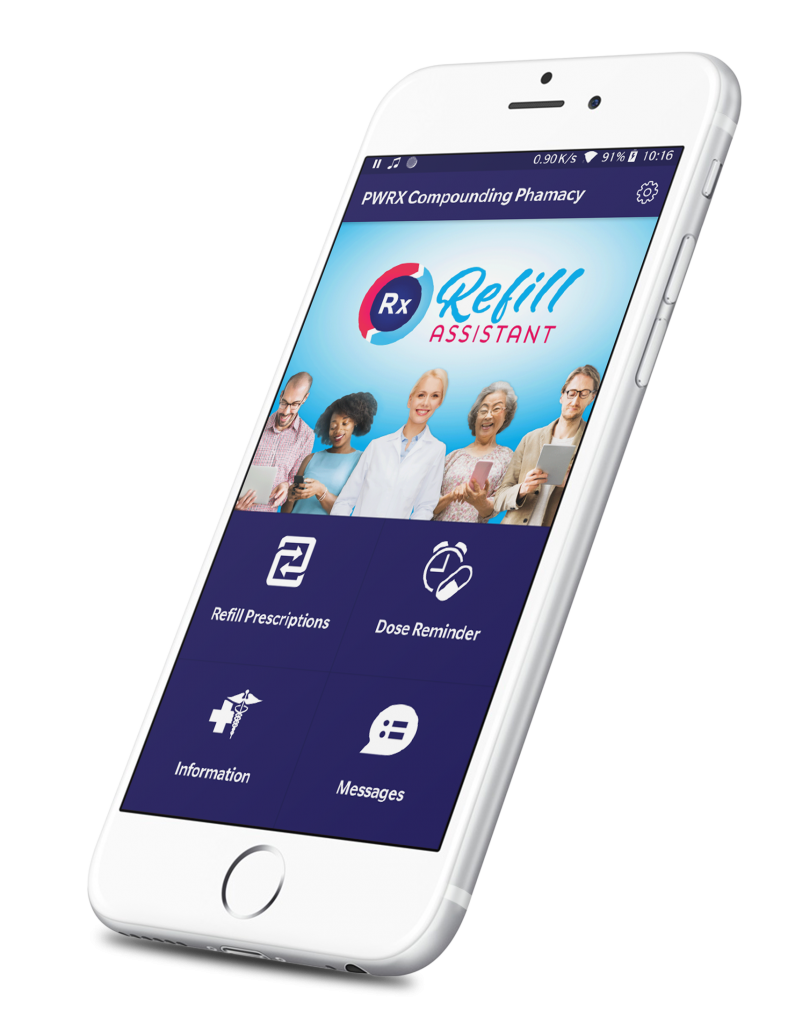
Mobile app interface for PWRX Compounding Pharmacy’s Refill Assistant showing features to refill prescriptions and manage medication refillassistant
These apps often integrate with pharmacy networks, electronic health records, and telemedicine platforms to provide comprehensive medication management services. Many apps offer features like medication reminders, refill notifications, and direct provider communication.
App-based services typically cost $0-50 monthly for premium features, making them among the most cost-effective prescription access options. Basic features often include prescription tracking, refill reminders, and pharmacy communication, while premium services may include provider consultations and comprehensive health management tools. These platforms work particularly well for tech-savvy patients who prefer digital healthcare interactions.
Transform your prescription management experience today – explore comprehensive pharmacy services and automated refill programs at Smile Pharmacy to discover how professional pharmaceutical care can simplify your medication routine.
Cost Comparison of Prescription Refill Methods
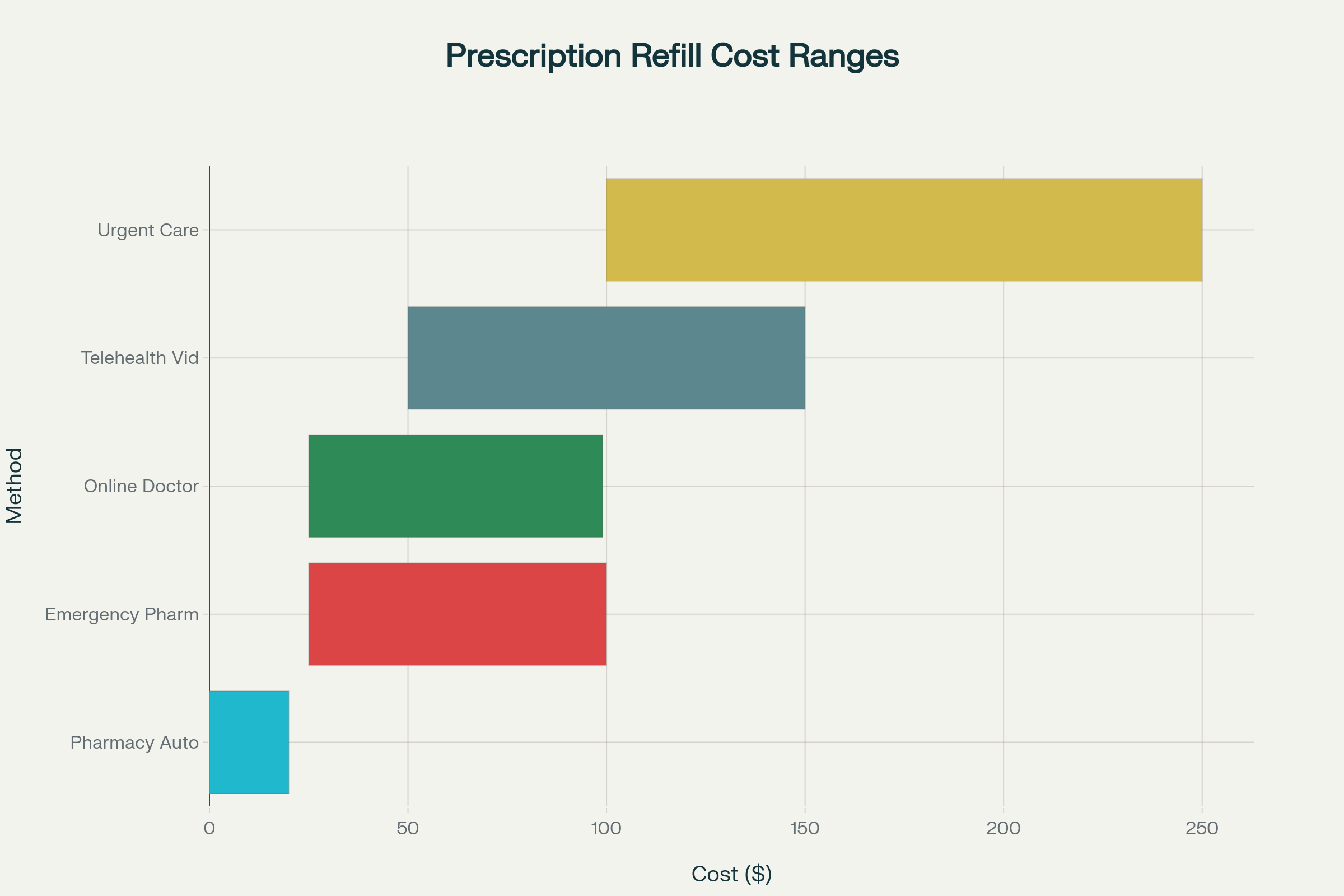
Cost comparison of prescription refill methods without doctor visits
Understanding the financial implications of different prescription refill methods helps patients make informed decisions about their healthcare access. Pharmacy automatic refill programs typically offer the lowest cost, requiring only standard prescription copays while providing maximum convenience. These programs eliminate additional consultation fees and work seamlessly with insurance benefits, making them the most economical choice for ongoing medication needs.
Higher-cost options like urgent care visits may be necessary for immediate needs or complex situations but should be considered carefully against their expense. Telehealth and online doctor services provide middle-ground options that balance cost with convenience, often proving more economical than urgent care while offering more comprehensive care than basic refill services.
Prescription Refill Methods Comparison Table
| Method | Availability | Medication Types | Doctor Authorization | Cost Range | Best For |
|---|---|---|---|---|---|
| Pharmacy Automatic Refill | 24/7 for enrolled medications | Maintenance medications only | Pre-authorized refills | Standard copay | Chronic medication users |
| Telehealth Video Consultation | Business hours + evenings | Most non-controlled substances | Online doctor approval | $50-150 per visit | Remote/busy patients |
| Urgent Care Visit | Extended hours/weekends | Most prescription types | In-person provider | $100-250 per visit | After-hours needs |
| Emergency Pharmacy Supply | Emergency situations only | Essential medications only | Emergency only (3-7 days) | Full medication cost | True emergencies |
| Prescription Transfer | During pharmacy hours | Existing prescriptions | Original prescriber | Standard copay | Pharmacy switching |
| Online Doctor Services | 24/7 for many services | Common conditions/refills | Licensed online provider | $25-99 per consultation | Minor conditions/refills |
| Pharmacy Consultation | During pharmacy hours | OTC + some prescriptions | Pharmacist discretion | Varies by service | Simple medication needs |
| Mobile Health Apps | 24/7 app access | Varies by app/service | App-connected providers | $0-50 per month | Tech-savvy patients |
Understanding Controlled Substances: Special Considerations
Federal Regulations and Refill Restrictions
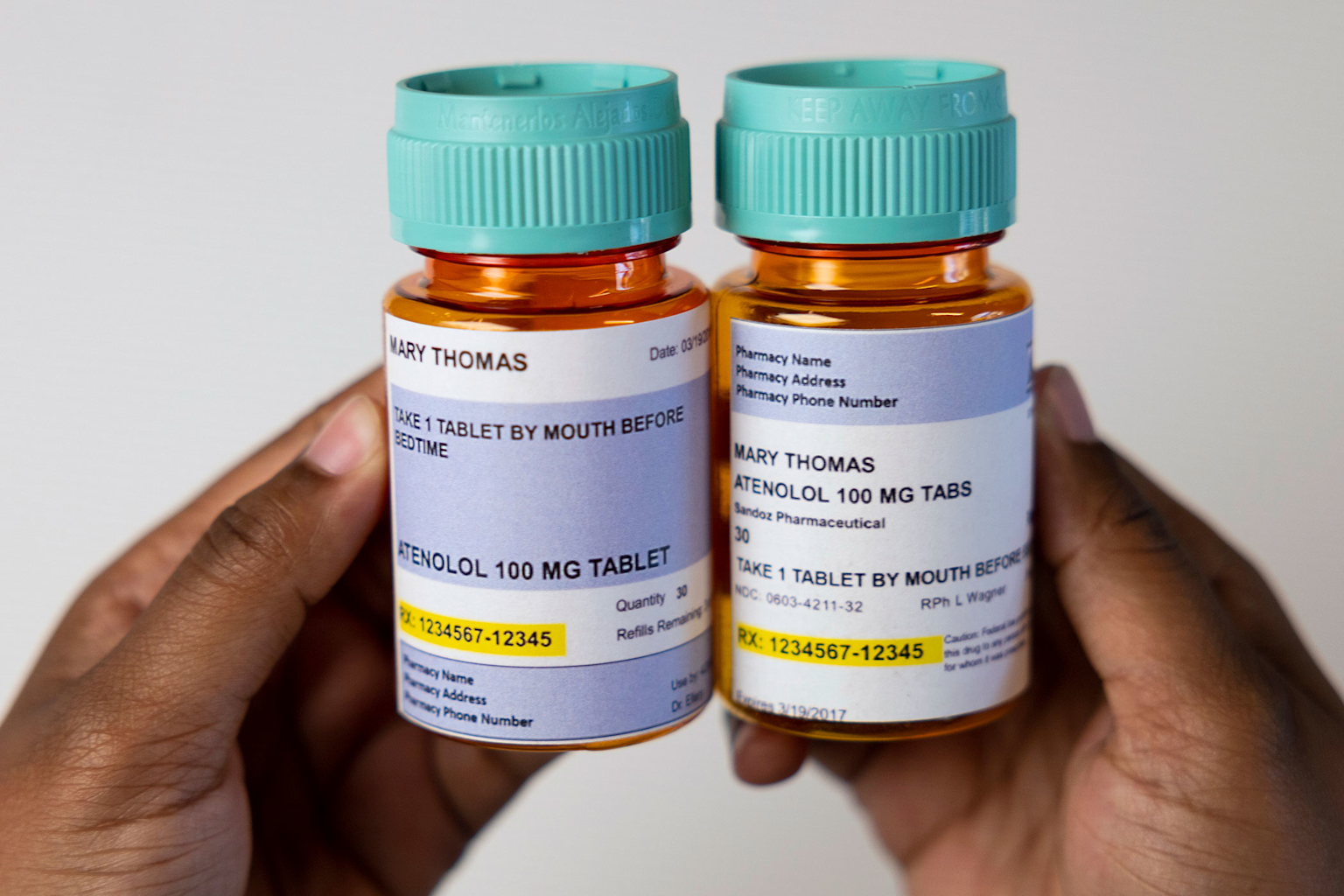
Prescription medication bottles labeled for Mary Thomas with Atenolol 100 mg and directions for use news.uga
Controlled substances require special handling under federal Drug Enforcement Administration regulations that strictly limit refill options. These medications, classified into Schedules II through V, have varying refill restrictions based on their potential for abuse and medical necessity. Understanding these classifications is crucial for patients who rely on controlled medications for legitimate medical needs.drugs+2
Schedule II medications cannot be refilled and require new prescriptions for each dispensing. These include powerful pain medications, stimulants for ADHD, and certain other medications with high abuse potential. Patients using Schedule II medications must work directly with their prescribing physicians and cannot use most alternative refill methods described in this guide.pmc.ncbi.nlm.nih+2
Alternative Access for Controlled Medications
Schedule III and IV medications allow limited refills (up to 5 refills within 6 months) but still require careful monitoring and provider oversight. Emergency supplies of these medications are extremely limited, typically restricted to 3-5 days in specific circumstances. Patients taking controlled substances should plan ahead and maintain regular contact with their healthcare providers to avoid medication gaps.drugs+1
Telehealth services for controlled substances remain available under extended DEA flexibilities, allowing established patients to receive controlled medication prescriptions through virtual consultations. However, initial prescriptions for controlled substances typically require in-person evaluations, and providers maintain strict oversight of these medications regardless of the consultation method.haponline+2
Controlled Substances Refill Rules
| Schedule | Examples | Refill Rules | Emergency Supply | Prescription Validity |
|---|---|---|---|---|
| Schedule II | Oxycodone, Morphine, Adderall, Fentanyl | NO REFILLS – New prescription required each time | Generally not allowed except in specific circumstances | 6 months (varies by state – some only 30 days) |
| Schedule III | Codeine combinations, Testosterone, Anabolic steroids | Up to 5 refills within 6 months from issue date | Limited emergency supply (3-5 days) in some states | 6 months from written date |
| Schedule IV | Xanax, Valium, Ambien, Tramadol | Up to 5 refills within 6 months from issue date | Limited emergency supply (3-5 days) in some states | 6 months from written date |
| Schedule V | Cough syrups with codeine, Pregabalin | Refills as authorized by prescriber | May be available as emergency supply | As specified by prescriber |
Emergency Situations: When Time is Critical
Recognizing True Medication Emergencies
True medication emergencies require immediate action to prevent serious health consequences from medication interruption. These situations typically involve essential medications for diabetes, heart conditions, blood pressure control, seizure disorders, and other conditions where medication gaps could cause immediate health risks. Understanding when situations qualify as true emergencies helps patients access appropriate care and avoid unnecessary costs.parkshoredrug+2
Emergency protocols prioritize patient safety while providing rapid access to essential medications. Pharmacists are trained to recognize emergency situations and can provide temporary medication supplies when appropriate, typically lasting 3-7 days to allow patients time to contact their regular healthcare providers. These emergency supplies often require full payment and should be followed up with regular medical care.greatermanchester.communitypharmacy+2
Travel and Geographic Considerations
Traveling patients face unique prescription challenges that may require emergency access methods. Running out of medication while away from home, losing prescriptions during travel, or needing refills in different states or countries can create urgent situations. Many prescription access methods work across state lines, including telehealth services, national pharmacy chains, and emergency supply provisions.parkshoredrug
Planning ahead prevents travel emergencies by ensuring adequate medication supplies, carrying prescription information, and researching pharmacy networks at travel destinations. However, when emergencies arise, patients should contact their insurance company’s 24/7 help line, use national pharmacy chains for prescription transfers, or seek care at urgent care centers or hospital emergency departments if necessary.parkshoredrug
Ready to simplify your prescription management? Contact Smile Pharmacy today to learn about automated refill programs and discover how professional pharmacy services can ensure you never run out of essential medications.
Frequently Asked Questions About Prescription Refills Without Doctor Visits
Can I get a prescription refill without seeing my doctor?
Yes, in many cases you can get refills through pharmacy automatic programs, telehealth services, emergency supplies, or by transferring existing prescriptions to another pharmacy. The method depends on your medication type, remaining refills, and specific circumstances. Most non-controlled maintenance medications offer multiple refill options without requiring traditional doctor visits.medicalnewstoday+2
What medications can be refilled without a doctor visit?
Most maintenance medications like blood pressure, diabetes, thyroid, and heart medications can be refilled through alternative methods. Antibiotics and controlled substances typically require new prescriptions from licensed providers. Chronic disease medications with established safety profiles and stable dosing regimens are most suitable for alternative refill methods.medicalnewstoday+1
Are controlled substances available for refill without a doctor?
No, controlled substances (Schedule II-V drugs like opioids, ADHD medications, anxiety drugs) typically require a new prescription from a licensed provider for each refill. Schedule II medications cannot be refilled at all, requiring new prescriptions each time. Higher schedule controlled substances may allow limited refills but still require provider authorization.drugs+1
How do automatic refill programs work?
Automatic refill programs enroll your maintenance medications for automatic processing 3-7 days before you run out, eliminating the need to request each refill manually. These programs improve medication adherence and reduce the risk of running out of essential medications. Enrollment typically requires one-time setup with your pharmacy.wlpharmacy+2
Can telehealth providers refill my prescriptions?
Yes, licensed telehealth providers can refill most non-controlled prescriptions after a virtual consultation, often more convenient than in-person visits. The DEA has extended telehealth prescribing flexibilities through 2025, making these services widely available and accepted by most insurance plans.medicalnewstoday+2
What is an emergency prescription supply?
Emergency prescription supplies are short-term medication provided by pharmacies (typically 3-7 days) when you cannot reach your doctor and need essential medication. These supplies are for true emergencies and usually require full payment since insurance may not cover emergency dispensing.greatermanchester.communitypharmacy+1
How long can emergency refills last?
Emergency refills typically last 3-7 days, giving you time to contact your regular provider. Some states allow up to 30 days for non-controlled medications in specific circumstances. The duration depends on state regulations and the pharmacist’s professional judgment.greatermanchester.communitypharmacy+2
Do I need insurance for telehealth prescription refills?
Most telehealth services accept insurance, with copays ranging from $0-99. Without insurance, consultations typically cost $25-150 depending on the service. Many employers now cover telehealth services as standard benefits, making them accessible and affordable for most patients.doctorondemand+1
Can pharmacists refill expired prescriptions?
Pharmacists cannot refill expired prescriptions without new authorization from a prescriber. You would need a new prescription or telehealth consultation to renew expired medications. This safety measure ensures medications remain clinically appropriate and prevents potentially harmful medication use.farmingtondrugs
What should I do if I run out of medication while traveling?
Contact your pharmacy first for emergency supplies, use telehealth services, visit urgent care, or call your insurance 24/7 line for guidance on local pharmacy networks. Many national pharmacy chains can transfer prescriptions between locations, making travel access more convenient.parkshoredrug
Legal and Safety Considerations: Protecting Yourself and Others
Regulatory Compliance and Patient Safety
All prescription refill alternatives must comply with federal and state regulations designed to protect patient safety and prevent medication abuse. These regulations ensure that alternative refill methods maintain the same safety standards as traditional doctor visits, including patient verification, medication history review, and clinical appropriateness assessment. Patients should only use legitimate, licensed providers and pharmacies for prescription refill services.drugs+1
Documentation requirements apply to all prescription dispensing, including alternative refill methods. Healthcare providers and pharmacies must maintain accurate records of all prescription activities, including emergency supplies, telehealth consultations, and refill authorizations. These records support continuity of care and ensure that patients receive appropriate medical oversight regardless of the refill method used.greatermanchester.communitypharmacy+1
Avoiding Prescription Fraud and Abuse
Legitimate prescription refill methods include safeguards to prevent fraud and medication abuse while ensuring patient access to needed medications. Patients should be wary of services that promise unlimited prescription access, don’t require proper medical evaluation, or offer controlled substances without appropriate oversight. Legitimate services will verify patient identity, review medical history, and maintain appropriate documentation.ocpinfo+1
Professional oversight remains essential even in alternative refill scenarios. Licensed healthcare providers, whether in-person or virtual, must evaluate the clinical appropriateness of prescription refills and ensure patient safety. Pharmacists providing emergency supplies or consultation services must exercise professional judgment and maintain appropriate records of their services.greatermanchester.communitypharmacy
Don’t let prescription access challenges compromise your health – explore professional pharmacy services and comprehensive medication management at Smile Pharmacy to ensure consistent access to your essential medications through multiple convenient options.
The Future of Prescription Access: Technology and Healthcare Evolution
Emerging Technologies in Prescription Management
Artificial intelligence and machine learning technologies are revolutionizing prescription management by enabling more sophisticated patient monitoring, drug interaction checking, and adherence support. These technologies support safer alternative refill methods by providing healthcare providers and pharmacists with better tools for patient assessment and medication management. AI-powered systems can identify patients who may benefit from alternative refill options while flagging those who require more intensive medical oversight.whereby
Digital health platforms continue evolving to provide more comprehensive prescription management services that integrate with existing healthcare systems. These platforms combine prescription tracking, provider communication, health monitoring, and medication adherence support into unified systems that improve patient outcomes while reducing healthcare costs. The integration of wearable devices, health apps, and telemedicine platforms creates new opportunities for proactive prescription management.whereby
Policy and Regulatory Developments
Healthcare policy continues adapting to support innovative prescription access methods while maintaining patient safety standards. The DEA’s extension of telehealth prescribing flexibilities through 2025 demonstrates recognition of alternative access methods’ value in healthcare delivery. Future policy developments are likely to expand these flexibilities while implementing additional safeguards to prevent abuse and ensure quality care.haponline+2
Interstate practice agreements and uniform licensing standards may eventually enable more seamless prescription access across state boundaries, particularly benefiting traveling patients and those in underserved areas. These developments could significantly expand the availability and convenience of alternative prescription refill methods while maintaining appropriate professional oversight and safety standards.
Conclusion: Empowering Safe and Convenient Prescription Access
The question “how to get prescription refill without doctor” has multiple legitimate answers that prioritize both patient convenience and safety. Pharmacy automatic refill programs emerge as the most convenient and cost-effective option for patients with stable chronic conditions, offering seamless medication access without the complexity of scheduling appointments or paying consultation fees. These programs represent the ideal intersection of convenience, safety, and cost-effectiveness for ongoing medication needs.wlpharmacy+2
Telehealth services provide excellent middle-ground solutions for patients who need professional medical evaluation but prefer remote consultations. The extension of telehealth prescribing flexibilities through 2025 ensures that these services remain accessible and reliable for appropriate prescription needs, offering professional medical oversight without the inconvenience of traditional office visits.medicalnewstoday+2
Emergency options like pharmacy emergency supplies and urgent care visits serve crucial roles for truly urgent situations, providing safety nets when patients cannot access their regular healthcare providers. While these options may involve higher costs or limited duration, they prevent dangerous medication gaps that could compromise patient health and safety.parkshoredrug+2
The key to successful prescription management without traditional doctor visits lies in understanding which method best fits your specific situation, medication needs, and health status. Patients with stable chronic conditions benefit most from automatic refill programs, while those with changing health needs may require more interactive options like telehealth consultations. Emergency methods should be reserved for true emergencies, with patients maintaining regular healthcare relationships for ongoing medical management.
Most importantly, these alternative refill methods complement rather than replace comprehensive medical care. They provide convenient access to established medications while maintaining appropriate safety oversight and professional standards. Patients should continue regular medical monitoring and maintain relationships with healthcare providers while taking advantage of convenient refill options for routine medication needs.
Ready to transform your prescription management experience? Visit Smile Pharmacy to explore automated refill programs and comprehensive pharmaceutical services that ensure consistent access to your essential medications. Professional pharmacy care combined with modern convenience features can eliminate prescription gaps and simplify your healthcare routine while maintaining the highest safety standards.
Take action today: Evaluate your current prescription refill challenges, identify the most suitable alternative methods for your needs, and implement systems that provide reliable medication access. Whether through automatic refill programs, telehealth services, or emergency access options, ensure you have multiple pathways to maintain your essential medications and support your ongoing health and wellness.
For additional guidance on safe prescription practices and regulatory compliance, consult authoritative resources like the FDA’s prescription drug information to ensure you’re making informed decisions about your prescription management and maintaining appropriate medical oversight for your healthcare needs.